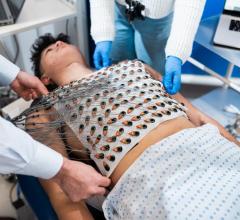
July 2, 2015 - Boston Scientific has initiated a worldwide study to evaluate the rate and causes of shocks for patients implanted with the Emblem subcutaneous implantable defibrillator (S-ICD). The device is indicated for primary prevention of sudden cardiac death in the setting of severely reduced cardiac function (left ventricular ejection fraction </= 35 percent).
Primary prevention patients do not have a previously documented life-threatening arrhythmic event, but are at risk of sudden cardiac death and thereby indicated to receive an implantable defibrillator. This group of patients represents the highest proportion of patients that are implanted with transvenous ICD (TV-ICDs) devices today in the United States and European Union.
In order to further demonstrate the usefulness of the S-ICD System in this particular patient population, the UNTOUCHED study will compare outcomes during an 18-month follow-up period to objective performance criteria derived from the Multicenter Automatic Defibrillator Implantation Trial-Reduce Inappropriate Therapy (MADIT-RIT) study. The landmark MADIT-RIT study evaluated shock rates in 1,500 patients implanted with TV-ICD devices and is one of the largest randomized trials to assess shock reduction strategies for TV-ICD devices.
"The MADIT-RIT trial demonstrated that standardized programming using higher rate cutoffs and longer delays to therapy reduces the incidence of inappropriate shocks for TV-ICDs," said Lucas Boersma, M.D., EU principal investigator and electrophysiologist at St. Antonius Hospital, The Netherlands. "The UNTOUCHED trial will examine the incidence of all-cause shocks when using the EMBLEM S-ICD System with standardized therapy settings similar to MADIT-RIT."
The first patient enrolled in the global, multi-site, prospective, non-randomized UNTOUCHED study received an Emblem implant by Craig Barr, M.D., cardiologist at Russells Hall Hospital in Dudley, England. The study will enroll a minimum of 2,015 patients at up to 200 sites worldwide. Enrollments in the United States will begin later this summer.
"In the published data to date, we have observed S-ICD devices demonstrate comparable inappropriate shock rates for arrhythmias to TV-ICDs," said Michael Gold, M.D., Ph.D., U.S. principal investigator and chief of cardiology and the Michael E. Assey professor of medicine at Medical University of South Carolina, Charleston. "Ideally, this trial will demonstrate S-ICD devices can either meet or improve upon the inappropriate shock rates experiences with TV-ICDs in MADIT-RIT within this large patient population."
The Emblem S-ICD system received CE mark earlier this year and was approved by the U.S. Food & Drug Administration (FDA) in March of 2015. The device launched in Europe starting in May, and became commercially available in the United States in June, in preparation for a planned full U.S. launch during the third quarter of 2015.
For more information: www.bostonscientific.com


 September 09, 2025
September 09, 2025 









